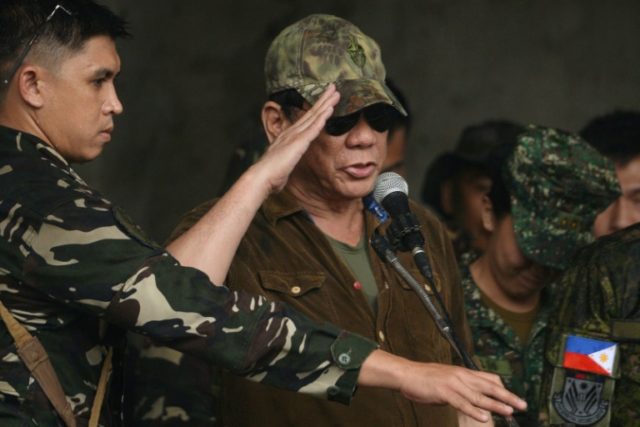Philippine President Rodrigo Duterte’s appearance at the Chinese-Filipino Business Club on Monday is proving to be a bottomless well of provocative comments.
Not only did Duterte suggest, in a fit of bizarre black humor, that Beijing should consider annexing his country and turning it into a province of China, but he also proposed sending his troops to China for training instead of the United States.
“My suggestion is the next batch should go directly to China … so there would be balance. So I’m sure there is an academy there to train good professional Chinese soldiers. Maybe China can accommodate them also and let them … not really to fight the Americans but terrorism,” said Duterte, as quoted by the Philippine Star.
He said this was necessary to achieve geopolitical “balance” between China and the United States, even as he admitted that the vast majority of Filipino soldiers would “immediately choose America” because they have “forced such a bond” with it.
“Let us be very clear on this, we are on good terms with America,” he qualified. “Special terms, military alliance—that’s why we cannot enter into another military alliance with any country because there’s only one.”
“Philippines now is veering towards China,” he continued in a whiplash-inducing rhetorical swerve. “But we maintain good relations. We have this (Philippines-U.S.) pact defense deal, we will honor it, I don’t know when. But if we go to war, everything wilts.”
Duterte spokesman Harry Roque clarified that the Philippines wishes to remain on “good terms with both the United States and China,” and is not in a position to wage war against China over its aggression in the South China Sea, which is “what some people want.”
“They want to assert our national sovereignty, I guess, through military means,” said Roque. “But the president is saying, ‘We don’t have to do that. We are in good terms with the Americans. We’re on excellent terms with the Chinese. If there’s conflict between them, so be it. But we will not take part in it.’”
Proving himself every bit as adept at rhetorical U-turns at his boss, Roque then added that the United States can be confident the Philippines will honor its treaty obligations, which is not very consistent with a platform of sitting on the sidelines while the U.S. and China duke it out in some hypothetical future conflict over territory claimed by the Philippines.
As the Philippine Star notes, critics of Duterte’s soft China policy are generally interested in pushing Beijing to accept international arbitration against its claims to control almost the entire South China Sea, not starting a war with China.
China has thus far displayed a pronounced lack of interest in court judgments against it. Duterte’s comments might be taken as a sarcastic admission that nothing short of a military confrontation will make China respect the claims of other nations, so the Philippines might as well accept that reality and strike the best submissive deal with China it can get. He also seems determined to signal to the United States that it cannot count on much support from his government if a serious confrontation with China develops, unless China pushes him too far, which was the thrust of his “why don’t you just go ahead and make us a province of China?” crack.
The Philippine opposition was not amused by Duterte’s quips.
“The President should be reminded that our territorial integrity and sovereignty are issues that should never be joked about,” said Rep. Gary Alejano of Magdalo, while Rep. Ariel Casilao of Anakpawis accused the president of holding a defeatist attitude against Chinese aggression.
“He only acts tough against opposition critics and poor Filipinos, but with China, he had the audacity to even [go] too far to make the Philippines a province of China. That is very unpatriotic,” Casilao said.
Sen. Antonio Trillanes IV joined the trio of critics with a comment in mixed Tagalog and English that translates to, “We need to call out those kinds of statements by the president because China might abuse it. For me, especially on that issue, it’s not proper for him to make that kind of joke.”
Duterte missed an opportunity to joke that sending his troops to China for training would be easy since China now has sizable military bases in the parts of the South China Sea that formerly belonged to the Philippines. That is not far from what Chinese officials actually said in response to his proposal, which was received very warmly in Beijing, which has sought closer military coordination with the Philippines ever since donating some weapons to the Filipino troops battling the Islamic State (ISIS) for control of the city of Marawi.
One analyst, retired People’s Liberation Army (PLA) Col. Yue Gang, suggested the Philippine military is a stubborn obstacle to developing stronger relations with China, and Duterte could “strengthen his influence over personnel choices in the future” by handing his military officers over to the PLA for training.
A practical objection to the idea was raised by former Philippine national security adviser Roilo Golez, who pointed out that Philippine “doctrines and equipment are generally compatible with those of the U.S. military,” a situation which “cannot be altered to adjust to the PLA.”

COMMENTS
Please let us know if you're having issues with commenting.